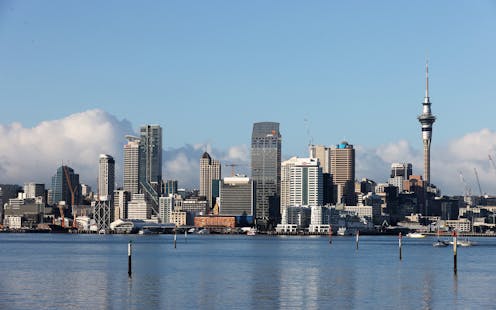New Zealand government takes a calculated risk to relax Auckland's lockdown while new cases continue to appear
- Written by Michael Plank, Professor in Applied Mathematics, University of Canterbury

The decision to move Auckland to alert level 3[1] from midnight on Tuesday is a calculated risk by the government. New daily cases in Auckland have stayed stubbornly high[2] over the past week, a period when many of us had hoped to see them fall to single digits.
On a positive note, most of these new cases have been identified by contact tracing and many have been isolated before they tested positive, meaning they have had fewer chances to infect others.
On the other hand, a worrying few continue to test positive before being identified by contract tracers. Ideally we would like to see no more of these cases because they are much more likely to have been infectious in the community. We can’t be confident that the Delta outbreak is contained until these become few and far between.
This doesn’t mean level 4 has failed or that level 3 will. By the time this outbreak was detected on August 17, there were several hundred cases in the community. Level 4 put the brakes on that, but our contact tracers have struggled to extinguish the outbreak entirely.
At this stage, there still appears to be a low level of spread between households. Level 3 gives the virus more opportunities to spread and contact tracers will have to work harder to get ahead of cases.
The government will be hoping that case numbers are now small enough for contact tracing to focus on the suburbs where spread is still evident.
Read more: With lockdowns easing for the rest of New Zealand, Auckland becomes the elimination frontline[3]
Contact tracers are finding that most new cases are not being infected in essential workplaces or services but via extended family or friends. This means some increase in the number of workplaces and services operating at level 3 may be a relatively low-risk way to relax the lockdown, provided they carefully follow the appropriate procedures.
But it also means it’s absolutely crucial people continue to stick to their bubbles. The level of risk has reduced over the past five weeks but the danger has certainly not passed. We all need to resist the temptation to meet up with family or friends.
New cases beyond Auckland boundary
One of the unexpected cases was someone who tested positive while being held in custody[4] after a court appearance. This man had been released from prison in Auckland on bail on September 8, returning home to Whakatīwai, which is outside the Auckland boundaries. He stayed at home, monitored electronically, until late last week when he returned to Auckland for a court appearance.
The most likely scenario is that he was infected as he left Auckland and has taken the virus home with him, passing it on to two primary school children in his household over the weekend of September 10-11. The two children would have been infectious at school last week so there is a high likelihood other children and parents associated with the school have caught the virus.
This is why the region has been put into its own level 4 restrictions for five days. This will allow time for testing and contact tracing to establish how widely the virus has spread there.
A more worrying possibility would be if the prisoner was infected in Whakatīwai by a family member. This could mean other cases were out in the community for some time. Whole-genome sequencing and testing in the community should tell us quickly if this was the case.
Where to from here
If this outbreak can’t be eliminated under level 3, it is unlikely Auckland will be able to return to level 2 for some time. The longer the outbreak goes on, the higher the risk it will eventually leak out of Auckland. This could send the whole country back into stricter alert levels while we complete the vaccination rollout, which is still months away.
In Auckland, more than 70% have had their first dose, but many still need their second. If there is a sustained growth in cases over the coming fortnight, the only real option would be to return to level 4 for a time to protect our health system.
The Australian states of Victoria and New South Wales are in this situation now with cases straining their health care systems. With no real prospect of elimination, they are now almost guaranteed to be under restrictions[5] for several months.
Read more: Whiteness in the time of COVID: Australia's health services still leaving vulnerable communities behind[6]
Whenever the government reduces alert levels, it shifts some of the responsibility for managing the outbreak to the public. There will certainly be relief at the easing of restrictions for some. But we need to enjoy the small additional freedoms that level 3 brings responsibly.
The fastest way to get out of lockdown is to eliminate this outbreak — and that relies on everyone continuing to stick to their bubble.
References
- ^ move Auckland to alert level 3 (www.rnz.co.nz)
- ^ stubbornly high (www.health.govt.nz)
- ^ With lockdowns easing for the rest of New Zealand, Auckland becomes the elimination frontline (theconversation.com)
- ^ held in custody (www.health.govt.nz)
- ^ restrictions (www.healthdirect.gov.au)
- ^ Whiteness in the time of COVID: Australia's health services still leaving vulnerable communities behind (theconversation.com)

















